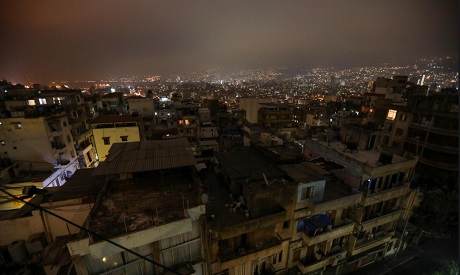
FILE PHOTO Buildings are seen at night during a power cut in some areas in Beirut, Lebanon July 6, 2020. Picture taken July 6, 2020. REUTERS
An asthma patient in Lebanon was forced to plug in his oxygen concentrator at a mosque Wednesday, its imam said, as growing power cuts cripple life in the crisis-wracked country.
Lebanon is mired in what the World Bank has called one of the worst economic crises since the 1850s, and the cash-strapped state is struggling to buy enough fuel to keep the lights on.
Many Lebanese blame what they see as a corrupt and incompetent political elite for the financial collapse that started in autumn 2019.
Hassan Moraib, an imam in Beirut, said he encountered the patient early Wednesday making the best of a generator turned on to welcome worshippers to dawn prayers.
The preacher posted a photo on Twitter of a man in a neatly pressed shirt sitting on a step and reading, as he breathed from a tube under his nose linked to a machine at his feet.
"A worshipper who suffers from asthma turned up at the mosque at dawn to be able to plug in his oxygen machine while the mosque's generator was on," he said.
They then kept the power on after the prayers ended, "because he had neither electricity nor a generator subscription at home".
"God curse those who brought us to this," he added.
For decades, those Lebanese who can afford it have paid two electricity bills -- one to the state and another to subscribe to a private back-up generator.
Power cuts in recent months have lasted up to 22 hours a day in some parts of the country, but even generator owners have been forced to ration output as fuel becomes more expensive, leading to periods of complete blackout.
The economic crisis has seen the Lebanese pound lose more than 90 percent of its value against the dollar on the black market, and left more than half the population living below the poverty line.
As Lebanese struggle to put food on the table amid soaring prices, many can no longer afford to pay to receive extra power from a neighbourhood generator.
Calls have multiplied on social media from Lebanese pleading for help to keep on medical equipment for their loved ones.
The international community has long demanded a complete overhaul of the electricity sector, which has cost the government more than $40 billion since the end of Lebanon's 1975-90 civil war.
Lebanon has been without a fully functioning government since the last once resigned in the wake of a devastating explosion at Beirut port last year that killed more than 200 people.
Short link: